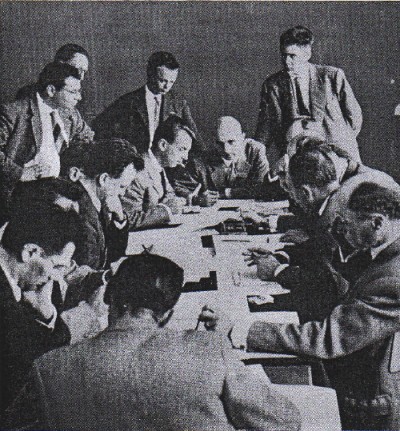Business games as a cultural technique
Transformation of knowledge and controlling at the intersection of economics, computerisation and mediality
The research project ›Business Games as a Cultural Technique‹ analyses the growing popularity of business games from the 1950s to the 1970s, as well as their influence on social practices beyond the realm of economics. The project is focussing on but not limited to the use of business games in the Federal Republic of Germany. It aims at providing new insights into the role that games play as a cultural technique within developed industrial societies. It is informed primarily by perspectives from media theory and cultural studies, which are complemented by historical research on the evolution of business games in Germany and Europe.
The first business games were developed after the Second World War and can be seen as an outcome of a new type of market economical rationality. They emerge in the context of broader changes in societal logics of control and at the intersection of corporate management and economic paradigms. The business game represents a cultural technique (Kulturtechnik) that is effective not solely in the field of education of a specific management style or economical prognostics, but for the society as a whole: intellectually influential through discourses of cybernetics, informatics and mediality and, concerning its key artefact, finally materializing in the medium »computer«. The serious games of the mid 20th century entail fundamental changes in (economic) controlling, for transformations of knowledge as well as for the accommodation of a new medium, accompanied by a new concept of rationality.
The research project is funded by the German Research Foundation (DFG) and rests on a close cooperation between teams of media scholars and corporate historians. Economic history, media theory and cultural studies are not confronted as autonomous approaches but as closely interconnected instruments that offer a synchronized exchange of ideas merged in an archeological and genealogical perspective on business games. Furthermore, the insights relating to the specific period of time that the project focuses upon can be transferred to contemporary realities: The post-WWII years of the 20th century are characterised by important ruptures that became decisive for current post-industrial steering logics and its related moments of crisis. It is this double perspective of historical recombination and critical incorporation that renders the research project innovative and fuels a deeper understanding of contemporary discursive currents – reaching from economics to critical theory.
Supported by German Research Foundation (Programme Research Grant NO 818/4-1)
 |
 |